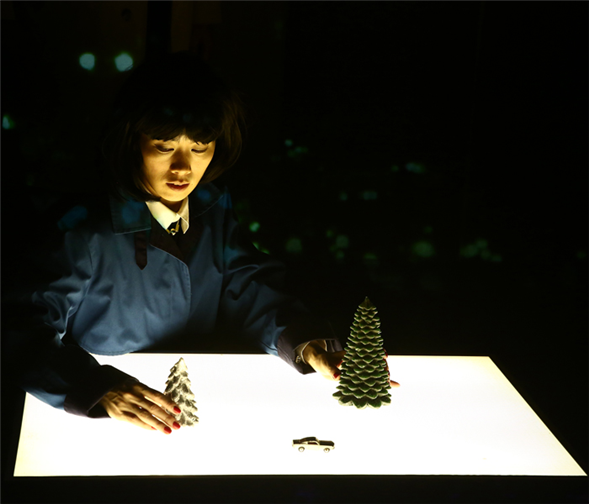Translate Page

When you hear that Lauren Petty and Shaun Irons have adapted a film for the stage, you might be taken aback. After all, these multimedia artists are known for their abstract, adventurous work, so aren't the movies a bit conventional?
Hardly. The duo's latest effort -- Why Why Always -- dismantles and repurposes its source material in so many ways that it perfectly suits their avant garde impulses.
It helps that the movie in question is Jean Luc Godard's Alphaville, a sci-fi infused, dystopian noir. While the film features pulp characters and a supercomputer, it is remarkably unconventional, incorporating everything from improvised scenes to existential reflections on the true meaning of an individual self. "We wanted something narrative," Petty says. "But not super narrative."
Nor is Why Why Always, which runs at the Abrons Arts Center through Saturday, a straightforward adaption. Petty calls the show a "live cine-cast" that is "an interpretation of an inspiration."
She continues, "We gave ourselves freedom to do whatever we want with the material. On the one hand, the process has been easier because we have a map to work off of, but it's harder when we want to cut something because you end up feeling beholden to the story. Jim Fletcher, in particular, has his eye on the story and would often say, 'You can't get rid of that because you'll lose this idea!' He is our guiding light in that way."
Fletcher plays a secret agent intent on saving the city of Alphaville from doom. There to distract him are seductresses played by Saori Tsukada, Laura Bartczak, and Marion Spencer. Their seduction methods emphasize just how interpretive the show really is. At one point, for instance, they try to overcome the agent with ASMR, which is the euphoric tingling you can feel because of certain gentle sounds or sensations. (Imagine the chill of pleasure from fingers running lightly up your arm or someone whispering in your ear).
"Alphaville is a place where poetry has been outlawed," Petty says. "So the ASMR tries to conjure an emotional throughline."
{Image1}
Elements like these were not created by Irons and Petty alone. The four performers also acted as dramaturgical guideposts, developing and devising almost every aspect of the production. "We don't have a traditional theatre team," Petty says. "It's us and the performers, and we very much perform it all together."
To that end, Petty and Irons run the tech boards and live media during the show, meaning they personally oversee how technology "responds" to live actors. "Putting the tech people into the process is a model that interests us," Petty says. "This way the whole theatre becomes the supercomputer, and you feel like you're inside of it."
Meanwhile, because the underground space at Abrons can feel like a dystopian bunker, the walls and ceilings, which are rich with live projections and processed imagery, suggest the inside of a computer's "brain." This type of sensory immersion allows Why Why Always to become a non-literal experience at almost every turn.
Still, Petty says there are sections that feel uncomfortably "dialogue-y" for her. That's when the piece turns to straight-up video installation. "Every now and then we open up the video and stop worrying about the story for five minutes," she says. "The ASMR helps with that too. And puts some air into the Alphaville story when we need it."
---
TDF Members: At press time, discount tickets were available to Why Why Always. Go here to browse all our current offers.
Eliza Bent is a Brooklyn-based writer and performer who regularly covers avant garde theatre for TDF Stages.
Photos by Paula Court. Top photo: A scene from Why Why Always.